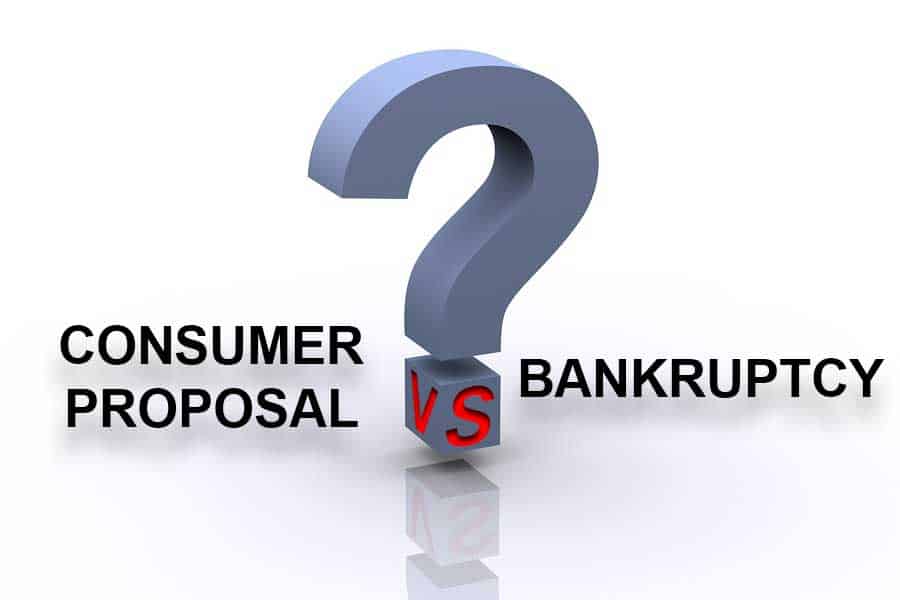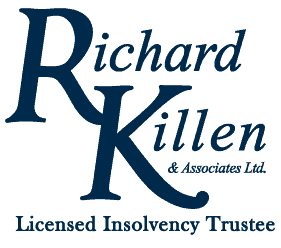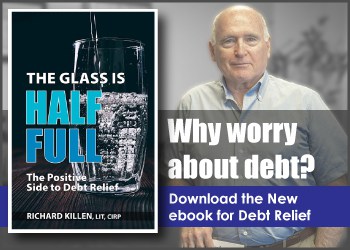Richard Killen on Tunedin with Lucy Zilio
In this video, Lucy Zilio talks with Richard Killen on Richard Killen & Associated 25th Anniversary.
Richard, a Licensed Insolvency Trustee (LIT) talks about more and more people with debt challenges choose a consumer proposal over bankruptcy in Toronto. Watch the video for more information.
Do I Have To Pay a Minimum Portion?
In this video, Richard Killen, a Licensed Insolvency Trustee in bankruptcy in Toronto talks about, Do I Have To Pay a Minimum Portion?.
Some people are under the impression that they go bankrupt or for that matter they do a consumer proposal, they are required to pay a certain percentage of what they owe, what their overall debts are. That’s not quite the way it works. In a bankruptcy, it’s not that at all. In a bankruptcy, there is a mechanism that will determine whether or not if you have to make any payments for your creditors into the bankruptcy. It’s based on what you earn, what your monthly salary is. There’s a formula for all that, and a Trustee explains that to you and a Trustee does the calculation and all that. In a proposal, it can be a little bit of a factor trying to determine how much you are going to offer the creditors and all that. But, there is no fixed idea that you have to pay 20% or 10% or 50% of whatever you owe. In a proposal, you offer the best you can, and you try to work out a deal with the creditors that they are willing to accept of what you are going to pay. In a bankruptcy, this formula is applied, if you earn enough money you will pay that money into the bankruptcy in order to obtain your discharge. It doesn’t matter what percentage it is.
If you are uneasy about bankruptcy you should definitely visit a licensed insolvency trustee so that you will be given an advice about your bankruptcy problems.
Will My Boss Find Out About My Bankruptcy?
In this video, Richard Killen, a Licensed Insolvency Trustee in bankruptcy in Ontario talks about if the boss can find out about the bankruptcy.
The only time that a person’s employer is officially told, that they have gone bankrupt or that they have done a consumer proposal, if they have been sued and garnished by somebody, and your employer is having to deduct money from your pay to send to the court because of the garnishee. The person going bankrupt is basically going bankrupt or doing a consumer proposal, that’s one of the big thing that they are trying to stop that garnishee. A bankruptcy and consumer proposal will do that but isn’t going to stop if we don’t tell the employer to stop it. Yes, the employer would get notified in that case. The other thing I can think of is offhand, and where we would have this kind of contact with an employer, is if we had to contact an employer to find out some information that is of important to the creditors. Like for instance, say you have a profit sharing plan at work, and your employer is the only one who has the details of it, the profit sharing might be money that belongs to the creditors in a bankruptcy, you see the trustee has to verify this information. Now, there are different ways of verifying it, we might be able to verify it by having you get the information and providing it to us so there is no direct contact with your employer. We prefer to do it that way as long as we can get the facts. Generally speaking, an employer is not, I can’t even remember the last time that we contacted an employer when there was no garnishee involved.
If you are uneasy about your bankruptcy you should definitely visit a licensed insolvency trustee so that you will be given an advice about consumer proposal and debt problems.
Will I Lose My Home If I Go Bankrupt?
In this video, Richard Killen, a Licensed Insolvency Trustee in bankruptcy Toronto answers the question most homeowners ask, which is “Will I lose my home if I go bankrupt or do a consumer proposal?”
Because you may have debt problems, you may be concerned with losing your home and most people figure that “if they go bankrupt they are never going to keep their house.” And for most people, that is a very traumatic thought, however, it can be avoided.
I found that over the last 10 years, very few people who own a home with equity have to lose the home if they don’t want to. They can find a way to keep it. The only way to keep it is to deal with the matter of equity. The trustee is responsible for obtaining the equity from the property in order to pass the money along to the unsecured creditors. They have the right to their money.
Therefore, if a person or family wants to keep their home, they’re going to need to arrange for financing or to pay the creditors. Of course, it depends on how much equity there is in the home. If you really want to keep your home, generally you can. You can keep it whether it’s a bankruptcy or proposal. In fact, if it’s a consumer proposal your home equity is not up for grabs. This really only applies to a homeowner declaring personal bankruptcy.
If you are a homeowner and considering a debt solution, I encourage you to call our office. Why lose sleep wondering what will happen. Your initial meeting is free, and in that meeting, we will explain all of your options so you may make an educated decision on the best option to obtain debt relief.
The Role of a Licensed Insolvency Trustee in Mississauga
The role of a Licensed Insolvency Trustee in bankruptcy Mississauga is critical in helping consumers who choose to go through the process of filing for bankruptcy to solve their overwhelming debt problems. Not only do they play a very big part in helping to minimize confusion, but they are present from beginning to end to make sure that every step of the process gets done as quickly and efficiently as possible.

Licensed Insolvency Trustees (LITs) are the only professionals licensed by the Federal Government of Canada to provide debtor information and advice to individuals and businesses with debt problems to help them make informed choices to deal with their financial difficulties. In addition, they are the only ones permitted by law to provide and perform debt restructuring services under the Bankruptcy & insolvency Act (BIA).
Licensed Insolvency Trustees in bankruptcy Mississauga were previously called bankruptcy trustees, or trustees in bankruptcy. The Office of the Superintendent of Bankruptcy Canada has recently changed their designation from bankruptcy trustee to Licensed Insolvency Trustee (LIT) in order to clearly differentiate them from debt consultants who are not licensed by the federal government to provide debt services.
The new designation is important to help eliminate any confusion or doubt among consumers about the legitimacy of LIT’s to provide government programs to eliminate debt. When dealing with a Licensed Insolvency Trustee, consumers are protected in three ways:
The Canadian government regulates the insolvency profession and ensures that Trustees are efficient and effective in complying with the insolvency process.
The Code of Ethics for Trustees establishes a standard for services that they are required to provide to a business or individual who has filed for bankruptcy.
The laws regulating the insolvency process makes sure that both the debtor’s rights and the creditor’s rights are respected.
In Mississauga, a Licensed Insolvency Trustee can provide a wide range of debt management solutions, including consumer proposals, loan consolidations, and bankruptcies. Insolvency Trustees are the most highly trained and educated debt experts that you can talk to. In most cases, trustees have obtained a university degree and most of them hold an accounting designation. For licensing, all trustees are required to complete a three-year bankruptcy and law course, pass a comprehensive oral examination, and undergo background investigation by the federal and national police force of Canada (the Royal Canadian Mounted Police). Only trustees who are licensed by the Office of the Superintendent of Bankruptcy Canada (OSB) can hold the designation of Licensed Insolvency Trustees.
Their role as debt professionals include the following:
- Provide free initial consultation to review your financial situation
- Explain to you in detail all your debt relief options, not just bankruptcy
- Recommend the best debt management solution that is best to your situation, which may or may not include any type of insolvency solution provided by the Bankruptcy & Insolvency Act
- Administer consumer proposals and bankruptcies and manage assets held in trust
- Gather all vital information to file the necessary documents and start insolvency proceedings
- Notify your creditors, accept and review all claims and administer the rules of the process
- Apply for your discharge or completion certificate once you’ve completed all your duties
- Ensure that everyone complies with their duties and responsibilities under the law.
If you are deep in debt and are getting harassed by non-stop collection calls and wage garnishments, consulting with a trustee is the most risk-free and inexpensive option you can take towards the right direction. A Licensed Insolvency Trustee in Mississauga can help you determine which debt relief option is best for you and your family so you can be on the road towards a debt free life.
Consumer Proposals in Toronto

In November 1992 the Bankruptcy Act received a broad overhaul for the first time since 1966. If you can imagine the changes that had taken place in Canadian society between those years you can understand that this was due; probably overdue. One of the main changes to the Act, other than re-naming it the Bankruptcy and Insolvency Act (BIA), was the introduction of something called a Consumer Proposal. It was a game changer.
A proposal of any kind is really an offer or a proposition, where one party extends that offer to another party in the hope that it will be accepted and both parties will mutually benefit from the new arrangement. Proposals had been around for 72 years, from the time the Bankruptcy Act was first made into law. But the proposals that were in use before 1992 were primarily intended for business and corporate use and were very difficult for the ordinary insolvent debtor, the ordinary non-business person, to use. There were many obstacles and speedbumps in the process which made it expensive and that alone drove people to use the bankruptcy itself as the only practical way they could resolve the debt problems.
Some trustees, in Toronto primarily Murray Hahn of the firm Clark, Henning & Hahn, tried to be as creative as they could and use the proposal option to allow their customers to try to reach a deal with their creditors. Up to a point it worked OK, but in the long run there were simply too many administrative problems and the initiative turned into a major problem for the government and the courts. But at least the need for a proposal regime designed for the consumer debtor had been established.
So in 1992 Parliament made the necessary amendments to the Act and November 30th of that year it became law. Interestingly the new Consumer Proposal system turned out to be pretty much what Murray had come up with on his own, only the law had now been tweaked to remove as many of the previous speedbumps and obstructions as possible. Anyway, we now had something called a Consumer Proposal for people to use.
At first very few people even considered the Consumer Proposal. All they thought about was Bankruptcy and, I guess, it took trustees a while to get use to the Consumer Proposal process themselves, so it was hard for them to explain it properly as a viable option to the tried and true bankruptcy process. So the first few years saw relatively few Consumer Proposals in use, but over time this began to change. Word got out. People, including trustees, got more familiar with it and therefore more comfortable with it, too. So today, 2016, roughly half the filings under the BIA are for Consumer Proposals, instead of the meagre number of the first few years.
So what exactly is a Consumer Proposal? Well, as they say, it isn’t rocket science. It is, however a very effective alternative to a Bankruptcy. Let’s start with what I said earlier: a proposal of any kind is an offer, a proposition. So that’s what a Consumer Proposal is, an offer. But really, it is a very specific and unusual offer.
A Consumer Proposal in Toronto or anywhere else in the world can only be made through a Licensed Insolvency Trustee (LIT) by an Insolvent Person. (I capitalized that term because it is legally defined under the BIA.) An Insolvent Person is someone who can demonstrate that he is unable to pay his debts as they generally come due. For most people that simply means they can’t meet their minimum monthly payments.
So, the Consumer Proposal is one of the options or solutions that the BIA provides for people who have run into serious debt trouble. The other main option, of course, is a Bankruptcy, but the Consumer Proposal is very different – on many levels.
The first noticeable thing about a Consumer Proposal, as opposed to a Bankruptcy, is that the debtor does not offer up all his property to the trustee for the general benefit of his creditors. As a matter of fact, his property, such as a house or investment, is not generally part of the negotiations. Instead, the debtor offers money to his creditors, in terms that he can actually perform. Since he couldn’t meet his minimum monthly payments the new terms will be something less that the regular monthly payment total. Sometimes a lot less.
For instance, let’s say the debtor’s debts amounted to $50,000.00, to 10 different creditors, 7 credit cards, 2 lines of credit and 1 personal loan. The minimum monthly payments total $1,000.00. His circumstances have deteriorated over the past year and he no longer can come up with the $1,000.00 every month. So, he makes a Consumer Proposal offering $500.00 a month, all he can afford.
Since the BIA puts a maximum time limit of 5 years to the terms of a Consumer Proposal, our debtor’s Consumer Proposal offer can be 60 payments of $500.00, a total of $30,000.00.
The second thing about a Consumer Proposal is that it operates very much like a Consolidation Loan, except there is no loan. If the Consumer Proposal is accepted by the creditors and approved by the court it becomes legally binding on all the unsecured creditors. This makes it effectively the new amount that the debtor owes and once our debtor has paid the $30,000 he will be out of debt. But to whom does he pay this $500 a month? To the trustee, of course, though with a Consumer proposal the trustee is called the Administrator.
So our debtor has made a $30,000 Consumer Proposal offer to his unsecured creditors. Now the ball goes over to the creditors’ court. Will they accept it or will they want more money. On the surface of it one might assume that the creditors probably would reject it. They not only would be losing $20,000 in capital, they also lose all the interest they would make over that 5 year span, because the moment the Consumer Proposal is filed all interest charges cease, and it stays that way for the duration of the Consumer Proposal. Depending on the interest rates, the creditors might be losing another 20,000 or more in lost interest.
However, there are some other factors that come into play which act as an inducement to the creditors to look more favourably on some kind of compromise.
The first of these is that if they simply ignore the Consumer Proposal after 45 days from the date of filing they will be stuck with those terms. The BIA makes approval a default unless the creditors get involved and at least voice an opinion on the terms offered.
The second thing is the alternative. It is usually quite evident to the creditors that the debtor is insolvent (otherwise he wouldn’t have been allowed to file the Consumer Proposal in the first place) and that the trustee has reviewed with debtor all the options available to him to resolve the debt trouble. Those other options include bankruptcy, so the debtor’s decision to make a Consumer Proposal instead of a Bankruptcy was a choice, not an obligation. It will likely be that if he has to do the Bankruptcy his creditors will receive a lot less than they would from the Consumer Proposal. In fact it is practically guaranteed that the creditors get more out of a proposal than they would out of a corresponding Bankruptcy. Otherwise why would they accept the Consumer Proposal?
If the Consumer Proposal terms he offered his creditors are not accepted the debtor may, probably will, go bankrupt. The creditors may be sufficiently un-enamoured with our debtor’s offer to want more money, but this can only be negotiated if they request a meeting to discuss it. If there is no request for a meeting at the 45 point the Consumer Proposal is deemed accepted as offered.
If the creditors do demand a meeting there can be some back and forth negotiating – through the trustee/administrator – until a deal is reached, or the creditors finally decide they are not interested in making a deal. In this latter case, the debtor will usually end up filing a Bankruptcy. Fortunately, the vast majority of Consumer Proposals are accepted.
After the creditors have said yes, the Consumer Proposal must be approved by the court. Fortunately this seldom, very seldom, requires an actual court hearing. 99.9% of the time the court approval of the Consumer Proposal is automatic, after a 15 day wait from the time the creditors said yes.
Once the court approval is obtained the rest is up to our debtor. The monthly payments start and must be kept up, with very little margin of error. If the Consumer Proposal falls 3 full monthly payments in arrears at any time over the next 5 years it will be deemed annulled. In other words, our debtor has a two month cushion to work with. He can enlarge this cushion by pre-paying the proposal if he has the means. For instance, let’s say 6 months after the court approved the Consumer Proposal our debtor gets a new job, making more money. The terms of the Consumer Proposal don’t change, so perhaps now instead of only paying the minimum $500 he can afford to $700 a month. It’s an open contract, so he he’s free to do that. If he does, after 5 such payments he will have added another 2 months to his cushion. That cushion can save the Consumer Proposal a year or two later if he runs into temporary trouble and can’t make even the $500 for a few months, so it’s a great idea to put as much as possible into the Consumer Proposal if he has the means.
When our debtor has paid the full $30,000 he will be officially out of debt to those 10 creditors he had at the beginning.
The effect of a Consumer Proposal on a person’s future credit prospects, as well as the speed with which he recovers his “good name” will depend on a lot of factors, like every credit granting decision. But one point always present in the process of determining whether to do a Bankruptcy or a Consumer Proposal is the reality of the current situation. An Insolvent Person can’t pay his debts the way the creditors have the right to demand. Unless that problem is resolved our debtor will never recover his “good name”. So the most practical and effective way to approach these decisions is to take a realistic look at the circumstances and determine what the priorities should be. It’s not much good gazing at the horizon if you’re going to trip over something at your feet.
As a final bit of information on Consumer Proposals I’d like to point out that our experience shows a large majority of Consumer Proposals in Toronto are successfully performed and they are fully paid in an average of 50 month – 10 months early. A win for everyone.
Bankruptcy Counselors Toronto vs Licensed Insolvency Trustee

It almost sounds funny, doesn’t it? Bankruptcy Counselors Toronto – somebody who counsels people, presumably in Toronto, on how to go bankrupt? Perhaps the term is misleading? I think so. Real Bankruptcy Counselors, in Toronto or elsewhere, don’t counsel people to go bankrupt. In fact a Bankruptcy Counselor would probably spend more time trying to figure out how the person seeking advice could stay out of bankruptcy rather than go in it.
The term Bankruptcy Counselor itself is probably incorrect, at least in terms of the title itself. There are no Bankruptcy Counselors in that sense. What we do have are Licensed Insolvency Trustees in bankruptcy, such as Richard Killen & Associates Ltd., who are Federally licensed to administer the legal process called bankruptcy, along with other processes under the Bankruptcy and Insolvency Act called proposals and Consumer Proposals.
But a Trustee (it’s quite a mouthful to keep saying Licensed Insolvency Trustee when you are writing an article) is uniquely placed to talk to a person in debt trouble about bankruptcy, or a consumer proposal, as an option to deal with their debt problems. The Trustee can explain in detail how they work, how they might apply to that person’s situation, what the short term, medium term and long term practical advantages and disadvantages are. What effect they may have on all kinds of practical situations such as employment, bonding, mortgage renewals, and so forth. There are so many questions and so many areas of concern that people have when they are trying to solve their debt problems.
Let’s face it. Nobody actually wants to go bankrupt and making a consumer proposal is not much higher on a person’s to do list, is it? And let’s face something else. Though nobody wants debt trouble, it does happen. In today’s world of relatively easy access to consumer credit such as credit cards and lines of credit, not to mention mortgages and car loans, is it any wonder people get into debt trouble. This is not to say that we are not responsible for our actions, but not everyone can live every moment of their life within the proper bounds of prudence and coldly logical decision-making. Being human emotions come into play and do make some financial decisions without properly thinking it through. Later if something bad happens, like losing a job or coming down with an injury or an illness, what is a person supposed to do?
The answer, of course, is to do the best they can. That’s what most people do.- the best they can. But, if things go from bad to worse, there will come a time when the best they can is no longer good enough for their creditors, who simply want to get paid. When it gets to that point, there are not that many options available. In fact, depending on the severity of the trouble (How far behind you are with your payments? Are creditors threatening legal action?) there may only be one way that the person can maintain some control over his or her situation: use the Bankruptcy and Insolvency Act.
But using the solutions provided by a federal law is not something you should go into on a wing and a prayer. A little information might be in order and this information will have to come from someone who knows all sides of it. That is what the Licensed Insolvency Trustee (I used the whole title here so I could explain it) is supposed to be – the go to guy. Let’s look at what the title means and how it might relate to the term Bankruptcy Counselors Toronto.
“Licensed” simply refers to the fact that the Federal government, through the agency of the Office of the Superintendent of Bankruptcy, is mandated by law to oversee the administration of each and every bankruptcy and proposal filed in Canada. The law though says that a Trustee must be appointed to actually do the administration of each bankruptcy or proposal. So, the OSB determines who is qualified to be a Trustee through a series of investigation and heavy-duty testing and then licences those people it deems qualified to handle the job. That’s when they issue a licence.
“Insolvency” refers to the fact that this Trustee’s licence is specifically intended to relate to matters covered by the Bankruptcy and Insolvency Act. Let’s face it, the term trustee is used far and wide. For instance there are school trustees, who I am sure would not want to be confused with Insolvency Trustees. So the word Insolvency is stuck right in the middle to make it clear that these individuals are qualified specifically in that area and that they have been tested as to their ability to provide that service.
“Trustee” has a very broad meaning. The dictionary says a Trustee is a person given powers of administration over property and is legally bound to administer it solely for the purposes specified, in this case by the Bankruptcy and Insolvency Act. So in English that would appear to mean that a Trustee is responsible to administer the bankruptcy (and proposal) process for the purposes intended. Though that might cover a lot of ground, advising people about Bankruptcy or Proposals would certainly fall within that sphere.
All of which brings us back to the term Bankruptcy Counselor Toronto. If you are in debt trouble, facing a financial crisis, and you realize the fact, what can you do about it?
The first thing I think any rational person would do is get information, maybe advice. You can ask relatives and friends, but other than getting a little moral support, that may not prove too helpful. You can always consult a professional person such as a lawyer or an accountant. Either of these can be a good move, but may not be enough. An accountant generally deals in financial situations that have not yet gone off the rails, so to speak. He can recognize the negative reality of your situation, but may not know enough of the details of the options available to design a specific plan to get you out of trouble. Of course that depends on how bad the situation has become.
A lawyer is usually there to give a different kind of advice. In fact, unless you consult a lawyer specializing in insolvency matters there will likely be a practical limit to what a solicitor can do to help, again depending on how far things have deteriorated.
A financial consultant is likely to be a bit like an accountant in that he’s used to dealing with solvent situations and will not have a fluency with the practical and administrative details of the options available to you if your situation has become insolvent.
So we come back to the Licensed Insolvency Trustee as the only truly qualified Bankruptcy Counselor Toronto, or any other place.
If you need advice about what to do now that you have, or are about to fall behind with your credit card and other debt payments and want to retain some kind of control over your situation, the Licensed Insolvency Trustee is the go to guy. As a Bankruptcy Counselor Toronto, or elsewhere, the Trustee will not be your advocate like a lawyer would, but at Richard Killen & associates Ltd. we provide financial debt counselling services where in we will analyze your situation and explain it to you in understandable terms so that you can know what will be the best option for you to take to resolve the problem in a dignified and responsible manner. Is there a better way to take care of a problem?
Insolvency Solutions and Information on the Internet

You are probably reading this on our website. Everybody nowadays seems to use the internet to look things up and research matters of interest to them. Insolvency solutions (bankruptcies and consumer proposals) are not an exception.
There are a thousand different things that could be said on a website or through social media about debt problems and the various solutions available to those in need of them. Information is information and the internet is wonderful at giving almost instant access to it. How many times have you been on Wikipedia this week?
However, the internet has its limitations, at least for now. The main thing it can do is provide objective information, facts, data. What it can’t do is provide diagnostic opinion in areas which are not confined to objective facts and figures. Let me give this example in our area of professional expertise.
We are often asked by folks who consult us about their debt problems whether or not they will lose their house if they go bankrupt or do a consumer proposal. (This is one of the primary concerns home owners in debt trouble have, as you can well imagine.) They looked it up on the internet and learned lot about the legal position of the Licensed Insolvency Trustee. In fact, the internet would likely be very black and white about the matter. What they will find out when they come in for a FREE consultation at Richard Killen & Associates is that the issue is much more grey than black and white.
The law provides the trustee with a fair amount of latitude in dealing with the disposition of property and should the debtor want to keep his house he most often does, albeit at a cost. Only the trustee can properly explain this and then only after he has properly assessed the debtor’s entire situation.
The objectives of the Bankruptcy and Insolvency Act are not one-sided. It seeks to provide an equitable justice for all the parties and this cannot be properly shown by a simple interpretation of a statute. That’s why no matter what data the internet might provide, explanations that truly matter to people can only be provided by a Licensed Insolvency Trustee – like Richard Killen & Associates.
So, if any of this has personal meaning for you, phone or email us now for a FREE consultation and get the full perspective and proper answers to all your questions. Remember, it may be the most stress-relieving call you ever make.
Richard Killen
Licensed Insolvency Trustee
How Does A Consumer Proposal in Toronto Work?

You hear a lot about consumer proposals in Toronto nowadays. Since, in my experience, practically nobody wants to do a bankruptcy it’s no wonder that consumer proposals have become the most talked about part of the personal insolvency business. In fact almost half the people who deal with a Licensed Insolvency Trustee like Richard Killen & Associates do a consumer proposal instead of a bankruptcy. But how do they work?
A consumer proposal works the same as a consolidation loan. Instead of having to pay 10 different credit cards every month you consolidate everything into one monthly payment. Overall it is often cheaper and it certainly takes away the stress and frustration of dealing with a bunch of different payments every month.
With a consumer proposal however, you don’t have to borrow any money. Getting a loan might not be easy. The lender may want collateral, or a co-signor, or maybe your credit rating has deteriorated. With a consumer proposal you don’t have any of these problems. You can consolidate everything into one monthly payment simply be filing a consumer proposal through a Licensed Insolvency Trustee like Richard Killen & Associates. It must be done with a Licensed Insolvency Trustee.
A consumer proposal is a legal settlement offer you make to all your creditors -combined. Some people have the means to offer enough to pay their creditors the full amount they owe them. Others do not have those means, so they offer what they can afford. Usually the creditors accept a lesser amount if they see it is the best you can do.
The trick is to make sure you will be able to make the payment every month. A consumer proposal i s limited to a term of 60 months. Say you owe $30,000.00 in credit cards and you can’t keep up the combined monthly payments. You determine that, with the utmost budgeting, you can afford a maximum payment of $400 a month. OK, you make a consumer proposal offering
$400 for the full 60 month; which comes to $24,000. It isn’t 100% of what you owe, but it may be acceptable to your creditors. They will determine their own best interests, but they may decide to accept it if they think you are doing your best and they see it is generally the best they will likely get. No matter the reasons, you can find yourself paying off your creditors in a way you can afford.
A consumer proposal is not magic, but it is a bona fide alternative to a bankruptcy and like I said earlier, over the last few tears it is being used almost as frequently as a bankruptcy by people in debt trouble looking for a solution.
So if you want to find out if this is for you call or email Richard Killen & Associates for a FREE consultation. It may be the most stress-relieving call you ever make.
Richard Killen
Licensed Insolvency Trustee
Consumer Proposal Vs Bankruptcy – What Is the Difference?

What is the difference between Bankruptcy and Consumer Proposal is a common question we hear all the time so today let’s do a comparison of consumer proposal vs bankruptcy.
I’ve been in the insolvency business discussing bankruptcy in Toronto for over 30 years and in all that time I don’t ever remember meeting anyone who wanted to actually go bankrupt. Let’s face it, who would? I have met an awful lot of people who did realize and accepted that bankruptcy was the solution they needed. But, going bankrupt had not been on their to-do list.
It is a common topic when choosing a debt relief solution. I know the vast majority of people who come to our office would greatly prefer to solve their debt problems in some way other than filing for bankruptcy. Many choose a consumer proposal or some other kind of debt consolidation versus personal bankruptcy. Ultimately, it boils down to finding out what options are available for you, what the consequences will be, and then deciding what is best for you and your family.
What is the difference between consumer proposal and bankruptcy?
A consumer proposal is a settlement made between you and the lender with the assistance of a Licensed Insolvency Trustee. The trustee will facilitate the negotiation between you and the creditor concerning the repayment terms. The agreement includes paying a reduced amount of your total debt owed within a certain period, usually five years. Once the agreement has been finalized, the creditors will not be able to take a portion of your income. Moreover, the interest on your debt will stop immediately.
On the other hand, bankruptcy involves taking over your assets to settle your debt with specific exemptions. Your Licensed Insolvency Trustee will work with you upon deciding to file bankruptcy, which is governed by the federal government. By declaring bankruptcy, your creditors can no longer go after you and you can have a fresh start in your financial goals upon relieving yourself from your debt. This is after completing your duties. However, no one wants to go bankrupt but depending on your financial struggles, this could also be the best solution to your debt problem.
Bankruptcy versus Consumer Proposal: How can you decide which best is for you?
A lot of things have to be considered when choosing between the two options. Do you want to keep most if not all your assets? If yes, you should consider going for a consumer proposal. There are also differences in the payment terms. A consumer proposal differs from bankruptcy in the sense that it requires a regular and fixed amount of payment based on what you agreed upon with your creditors. As with bankruptcy, you will be obligated to pay an amount based on your salary and other factors. A proposal will also have a lesser impact on your credit score but will still have an impact. Filing bankruptcy will make you debt-free faster than a consumer proposal.
The first step in making this work is to talk to a Licensed Insolvency Trustee. A trustee is licensed by the federal government with the duty to assess your situation for you and explain all the options and consequences. Once you know what paths are available and where they will lead, you can decide which one to take. Though the decision must be yours, their job is to make things as clear to you as possible so you can make the best choice for your financial situation.
Now here’s the neat part. That consultation with Richard Killen & Associates is FREE- no charge, no strings attached. Not a bad price for the kind of empowerment a person with debt problems wonders if she or he will ever find.
So don’t stew about those bills anymore. Call us or contact us by email and make an appointment for that free consultation. Remember, it may be the most stress-relieving call you ever make.
One of our Licensed Insolvency Trustees will explain the difference between bankruptcy and consumer proposal, and the pros and cons of each, however, ultimately, it’s up to you to decide on a bankruptcy vs consumer proposal to solve your debt problems.










